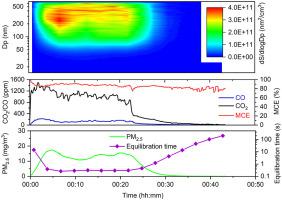Chemosphere ( IF 8.8 ) Pub Date : 2020-12-03 , DOI: 10.1016/j.chemosphere.2020.129178 Xinghua Li , Kaiqiang Yang , Zihao Wang , Yan Xie , Philip K. Hopke , Xiang Li , Chunyu Xue

|
Household biofuel burning contributes a large proportion of fine particulate matter (PM2.5), black carbon (BC), and organic carbon (OC) emissions in many parts of the world. Dilution sampling has been widely used to characterize PM2.5 emitted from biofuel burning. The residence time in the dilution chamber is a key parameter for accurate sampling. However, residence time has not yet been adequately characterized for biomass combustion. In this work, we investigated the effects of residence time of dilution sampling on PM2.5 emissions from a typical Chinese household stove burning typical biofuels including three major crop wastes and one type of wood. The filter based measurements indicated that the emission factors for PM2.5 and its main chemical components such as OC, EC, Cl−, and K+ did not vary with the residence time over the range of 1–80 s. Theoretical estimation of average time scale for achieving dynamic equilibrium (τs) between the gas and particle phase in the dilution sampling system was less than 1 s. Both the measurement study and theoretical simulations indicated that dilution sampling with a residence time of 1s can provide adequately reliable results for PM2.5 emissions from biofuel burning under the condition of these experiments. A simple way to estimate the equilibration time based on measured average PM2.5 concentration was proposed. Recommendations are provided for the residence time for dilution sampling of accurate measurements of PM2.5 emissions from biofuel burning.


























 京公网安备 11010802027423号
京公网安备 11010802027423号